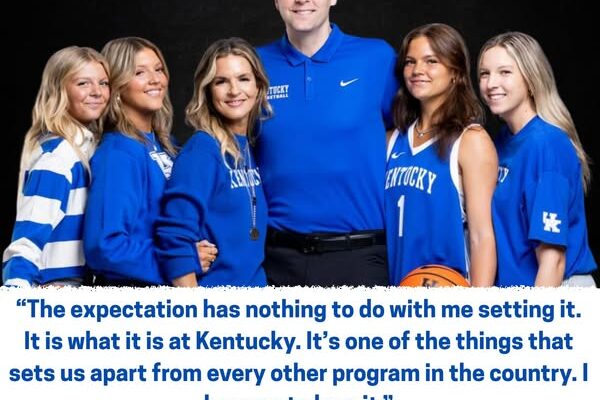According to Mark Pope, he need not be concerned about raising expectations at Kentucky. There are already expectations
Mark Pope’s perspective on the expectations surrounding the University of Kentucky basketball program offers a fascinating insight into the pressures and realities of coaching at a high-profile collegiate program. His assertion that he “need not be concerned about raising expectations at Kentucky” because “there are already expectations” encapsulates the complex environment in which coaches operate at historically successful basketball schools. To fully understand this stance, it’s important to explore several dimensions: the historical context of Kentucky basketball, the nature of expectations at elite programs, the psychological impact on coaches and players, and the broader implications for program management and culture.
Kentucky basketball is a storied program with a rich history of success, deeply embedded in the identity of the university and the state. It boasts numerous NCAA championships, a legacy of legendary coaches, and a pipeline to professional basketball that few programs can rival. This legacy naturally creates an atmosphere where expectations are inherently high. Fans, alumni, media, and administration all anticipate consistent success, often viewing winning not just as a goal but as a baseline requirement. For any coach stepping into this role, it’s clear that expectations are already baked into the job description. The program’s past successes set a precedent that no new coach can escape, and this reality significantly influences how Mark Pope approaches his role.
Pope’s statement reflects an understanding that the job at Kentucky involves managing and meeting those pre-existing expectations rather than creating them anew. This mindset is crucial because it shifts the focus from promising future achievements to navigating and fulfilling the expectations that are already imposed by the program’s history and fan base. This is a subtle but important distinction. Coaches at smaller or less prominent programs often focus on “raising expectations” as they seek to build credibility and momentum. At Kentucky, however, the challenge lies in sustaining excellence and managing the pressure that comes with it. Pope’s acknowledgment indicates his awareness of the weight he carries and the need to operate within an environment where the appetite for winning is insatiable.
The nature of expectations at elite programs like Kentucky is multifaceted. Expectations extend beyond just winning games; they encompass player development, recruitment, maintaining program integrity, fan engagement, and media relations. The pressure is compounded by the fact that Kentucky basketball is often viewed as a benchmark of college basketball excellence. Success is measured not only in wins and losses but in the ability to recruit top-tier talent, develop NBA-ready players, and maintain the program’s national prominence. For Mark Pope, this means his role is not simply about coaching basketball games but about managing a complex ecosystem of demands, all under the microscope of intense scrutiny.
Psychologically, the presence of these expectations can be both a motivating force and a source of stress. Coaches and players must cultivate resilience to thrive under constant pressure. Pope’s acceptance of the existing expectations suggests a pragmatic approach to this stress: rather than fighting against the weight of expectations, he embraces them as part of the environment. This acceptance can be empowering because it allows for a clear-eyed focus on the task at hand. Instead of being distracted by the enormity of what’s expected, Pope can channel energy into strategy, preparation, and leadership. This mindset also sends a message to players and staff that the program’s standards are non-negotiable and that everyone is expected to rise to the occasion.
Furthermore, Pope’s comments hint at a broader understanding of program culture and continuity. Kentucky’s basketball program is not just about individual seasons but about sustaining a tradition of excellence over decades. By stating that he does not need to raise expectations, Pope implicitly acknowledges the responsibility to maintain and build upon the foundation laid by his predecessors. This respect for history and culture is vital in a place like Kentucky, where fans and stakeholders value legacy as much as immediate results. It suggests that Pope’s approach will likely blend respect for tradition with innovation, aiming to preserve Kentucky’s elite status while adapting to the evolving landscape of college basketball.
The implications of Pope’s perspective also extend to recruitment and player relations. Prospective players who consider Kentucky understand the high expectations and intense competition inherent in joining the program. Pope’s clear recognition of these expectations can help set transparent standards from the outset, ensuring that recruits are mentally prepared for the demands they will face. This can foster a culture of accountability and ambition, where players are motivated to perform at their highest level because they know that excellence is the norm, not the exception. It also helps in managing player development pathways, where the goal is to prepare athletes not just for college success but for professional careers, maintaining Kentucky’s reputation as a launching pad for the NBA.
At the same time, Pope’s stance underscores the challenge of balancing expectations with realistic goal-setting. While Kentucky’s history demands high achievement, every team and season is unique, with its own set of strengths and limitations. Coaches must temper public expectations with honest assessments of their team’s capabilities. Pope’s acknowledgment of existing expectations does not mean ignoring the difficulties of competition or the unpredictability of sports. Instead, it suggests a nuanced approach that respects the program’s standards while recognizing that each season will bring different challenges. This balance is critical to maintaining credibility with fans and stakeholders and to fostering a healthy team environment.
Moreover, Pope’s attitude can be seen as a strategy for long-term program stability. By not focusing on raising expectations, he avoids the pitfalls of overpromising and underdelivering, which can lead to frustration and loss of confidence among fans and the media. Instead, his focus is on steady progress, meeting the high bar already set, and building a sustainable model of success. This approach may lead to more consistent performance over time, rather than volatile swings based on hype and unrealistic goals. It also signals a mature leadership style, one that values process and culture as much as outcomes.
In a broader sense, Pope’s recognition of the entrenched expectations at Kentucky reflects the realities of coaching at any major sports program with a winning tradition. Whether in college or professional sports, coaches inherit legacies that shape how their performance is judged. The job is rarely about changing the culture from scratch but about managing and evolving it. This involves navigating the expectations of diverse stakeholders, including fans, alumni, administration, players, and media. Pope’s comment is a succinct acknowledgment of this reality and an indication of his readiness to operate within it.
In conclusion, Mark Pope’s assertion that he need not be concerned about raising expectations at Kentucky because they are already present speaks volumes about his understanding of the unique pressures and responsibilities of coaching at a top-tier basketball program. It highlights the historical weight of the Kentucky basketball legacy, the multifaceted nature of expectations in elite sports environments, and the psychological and strategic approaches needed to succeed. By embracing the existing expectations rather than attempting to raise them, Pope positions himself as a leader who respects tradition, manages pressure pragmatically, and focuses on sustaining excellence. This perspective is not only insightful but also essential for navigating the high-stakes world of Kentucky basketball, where expectations are a given and meeting them is the true measure of success.



